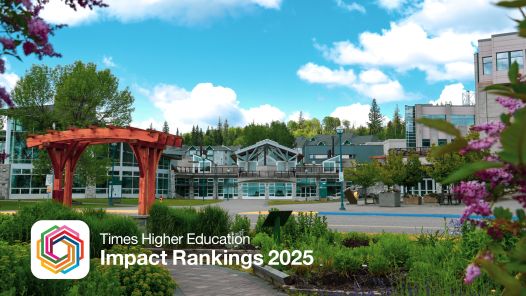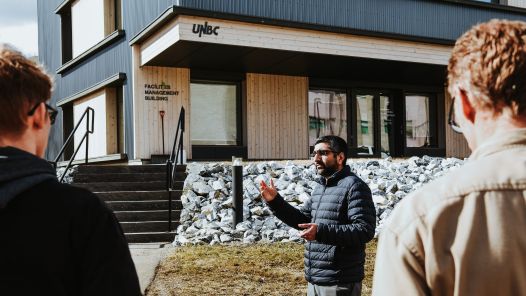
"Take urgent action to combat climate change and its impacts."
As Canada’s Green University, UNBC has had a long and standing commitment to climate action within the institution and in local, regional, and global communities. This action has taken many forms. Dr. Stephen Dery, for example, developed climate projections for the City of Prince George for the next 20 years based on data taken from the past 50 years and computer modeling. The resulting report has been employed by the city in some of its climate change mitigation strategy. Drs. Brian Menounos and Jospeh Shea have been working on understanding glacial retreat and its implication for water sources both in North America and in Asia. Dr. Phil Burton has engaged in research around the impact of changing climate on the composition and speciation of forests in northern B.C. The work of numerous researchers has been published in publicly accessible journals and presented to members of local and provincial governments. At all levels, in both teaching and research, UNBC is engaged in climate action.
UNBC Sustainability Strategic Plan (2025 - 2035)
The UNBC Sustainability Strategic Plan (2025–2035) directly supports UN Sustainable Development Goal 13: Climate Action by setting ambitious targets to reduce greenhouse gas emissions, promote energy-efficient buildings, expand low-emission transportation options, and integrate sustainable practices across campus operations. By embedding climate-conscious planning, fostering Indigenous and community partnerships, and engaging students through education and initiatives like Green Week, UNBC advances climate resilience, mitigates environmental impact, and cultivates a culture of proactive climate action.
UNBC Green Day
Every spring, Green Day is held to celebrate UNBC's achievements in sustainability with keynote speakers, panelists, workshops, activities, and fairs. This event is open to the UNBC Community and to all members of the public and many activities are free to attend!
UNBC Green Fund
The Green Fund takes money from a levy on parking fees at UNBC to go towards supporting sustainability at UNBC through two funding streams:
Green Project Grant
The Green Grant has two intakes of applications per year: October and February. Green Fund applications are accepted from any member of the UNBC community (Prince George and Regional campuses), including students, staff, faculty and campus based organizations. The Green Grants program is primarily focused on providing one-time, seed funding for research, education and civic engagement projects that promote sustainability at UNBC.
Green Travel Grant
The Green Travel Grants program supports knowledge sharing and education that promote campus sustainability at UNBC. We do so by providing financial support for travel and registration fees for conferences/training sessions/etc. that add to the sustainability knowledge and skills base at UNBC, or communicates the UNBC experience to a broader audience. All members of the UNBC community (Faculty, Staff, Students) can apply for a Green Travel Grant.
Climate Change Accountability Reports
As a public sector organization (PSO) in British Columbia, UNBC is part of the province's Carbon Neutral Government program, as mandated by the Climate Change Accountability Act (CCAA). This requires the university to annually account for, report on, and offset its carbon emissions.
UNBC has prepared a report for each calendar year since 2009, which are available for viewing below, outlining their goals and achievements for de-carbonization.
Strategic Energy Management Plan
The UNBC Strategic Energy Management Plan (SEMP) is a cornerstone of the university’s commitment to SDG 13, Climate Action. Since 2011, UNBC has implemented numerous energy efficiency projects, leading to a 40% reduction in electricity use and a 24% decrease in natural gas consumption from 2010 levels. These efforts have resulted in utility cost savings of $3.2 million and $2.6 million, respectively. The SEMP emphasizes the adoption of renewable and efficient energy systems, particularly beneficial for northern and remote communities. Through initiatives like the expansion of an award-winning bioenergy system, UNBC demonstrates leadership in energy efficiency and provides a model for communities transitioning to renewable energy sources.
Pacific Institute for Climate Solutions
The University of Northern British Columbia (UNBC), as part of the Pacific Institute for Climate Solutions (PICS) knowledge network, contributes to SDG 13: Climate Action by collaborating with leading researchers from across British Columbia and around the world to study the impacts of climate change and develop strategies for mitigation and adaptation. Through interdisciplinary research and partnerships with governments and Indigenous communities, UNBC helps advance practical, science-based solutions that build climate resilience. Programs such as the Northern BC Climate Action Network (NorthCAN) and community-focused sustainability initiatives empower northern communities to address climate challenges, supporting global efforts to combat climate change and promote sustainable development.
Northern Regional Energy Dialogues
The Northern Regional Energy Dialogues project at UNBC, let by Dr. Sinead Earley and her colleagues, supports SDG 13: Climate Action by engaging northern British Columbia communities in discussions about sustainable and low-carbon energy solutions. By amplifying the perspectives of small, rural, and remote communities, the initiative helps identify energy strategies that reduce reliance on fossil fuels, improve energy efficiency, and promote cleaner, renewable energy adoption. This community-driven approach fosters climate resilience, supports informed decision-making for local energy planning, and contributes to regional efforts to mitigate greenhouse gas emissions, aligning with global targets for climate action and sustainable development.
Northern BC Climate Action Network (NorthCAN)
The University of Northern British Columbia (UNBC) actively contributes to the Northern BC Climate Action Network (NorthCAN), a regional initiative established in 2022 to facilitate climate action across northern communities. NorthCAN serves as a collaborative hub, connecting individuals from local governments, Indigenous communities, health and education sectors, business and industry, and non-governmental organizations. The network aims to identify and celebrate opportunities for climate action that are tailored to the unique needs of northern B.C., encourage regional innovation, and identify funding opportunities.
UNBC's involvement includes organizing and participating in events such as the NorthCAN Forum, which brings together over 100 participants from across the province to discuss local climate action and energy transition. These forums provide a platform for sharing knowledge, discussing challenges, and exploring solutions that are relevant to the northern context.
Through its engagement with NorthCAN, UNBC supports SDG 13: Climate Action by supporting collaboration, sharing knowledge, and developing strategies that address climate challenges specific to northern British Columbia. This collective effort contributes to building resilient communities and advancing sustainable practices in the region.
The Energy Transition Group
The Energy Transition Group (ETG) at the University of Northern British Columbia (UNBC), formed in January 2024 in collaboration with the Prince George Electric Vehicle Association (PG EVA), actively supports SDG 13: Climate Action by supporting informed public discussions on sustainable energy practices. Meeting biweekly, the group brings together experts and community members to explore topics such as electric vehicles, energy efficiency, waste reduction, and renewable energy technologies. ETG also organizes tours of local energy projects, giving participants first-hand insights into practical applications of clean energy solutions. Through these discussions and activities, the group raises awareness, promotes sustainable practices, and encourages local action to reduce greenhouse gas emissions, strengthening community resilience and contributing to global climate action efforts.
Climate Education in Teacher Education
UNBC’s Climate Education in Teacher Education (CETE) initiative directly supports SDG 13: Climate Action by equipping educators with the knowledge, skills, and resources needed to teach and lead climate-responsive learning. Through professional development, participatory research, and collaboration with partners such as Learning for a Sustainable Future and the Institute for Environmental Learning, CETE empowers teachers in northern British Columbia to engage students in understanding local climate challenges, developing adaptive and mitigative responses, and fostering climate resilience within their communities. By integrating Indigenous perspectives, place-based learning, and evidence-informed pedagogy, the initiative strengthens climate literacy and collective capacity for action, advancing both climate adaptation and mitigation efforts across the education system.
The MECHE project
The Monitoring Extreme Climate and Hydrometeorological Events (MECHE) project at the University of Northern British Columbia (UNBC) is an interdisciplinary research initiative that directly contributes to SDG 13: Climate Action. Led by Dr. Stephen Déry, MECHE aims to better understand and predict extreme climate and weather events in western Canada, particularly in the upper Nechako Watershed. The project focuses on monitoring and predicting compound events associated with atmospheric rivers, tracking atmospheric and terrestrial pathways of storm-generated precipitation, and identifying extreme climate and weather compound events that trigger major wildfires. By generating improved predictive models and developing a warning system for extreme events, MECHE enhances resilience to climate-related hazards and supports informed decision-making in the region.
Sustainability in action at UNBC
Upcoming events
There are currently no events to display.
Explore the SDGs
UNBC is committed to advancing the United Nations Sustainable Development Goals (SDG) through a wide range of initiatives aimed at fostering sustainability, inclusivity, and global responsibility.


